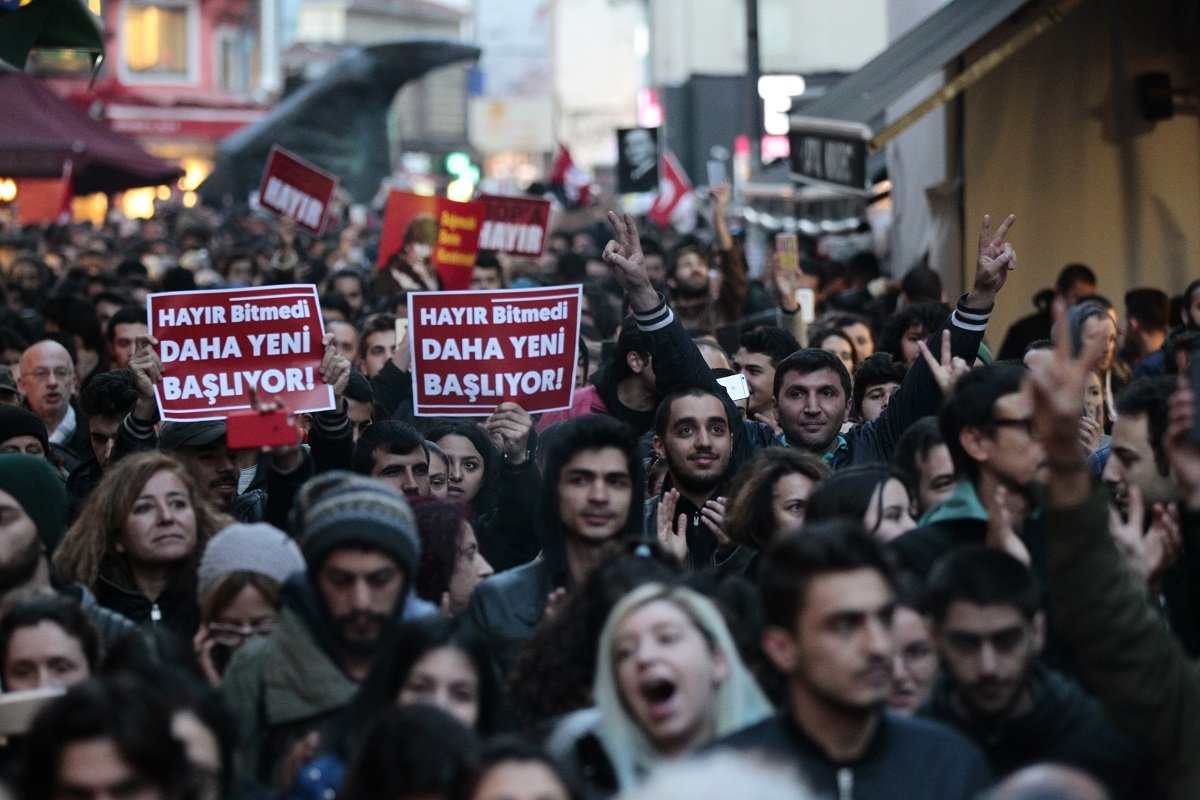Following the main opposition Republican People’s Party (CHP), the pro-Kurdish Peoples’ Democratic Party (HDP) has also applied to Turkey’s Supreme Election Board (YSK), demanding the cancellation of the results of a referendum held on April 16 due to irregularities in the voting process.
A package for constitutional change that will introduce an executive presidency in Turkey received 51.4 percent of the vote in favor in the referendum held on Sunday, but some opposition parties have contested the results due to the use of unstamped ballots.
HDP group deputy chairperson Ahmet Yıldırım and HDP deputies Mithat Sancar, İmam Taşçıer, Ertuğrul Kürkçü, Müslüm Doğan and Bedia Özgökçe Ertan submitted a petition to the YSK on Wednesday demanding the cancellation of the referendum results.
Speaking to reporters, Sancar, who is also a jurist, said by accepting the unstamped ballots as valid, the YSK made the determination of the violations in the referendum impossible. “The election is flawed, and there is no possibility of correcting it. It is no longer possible to determine how many of the ballots cast came from outside and how many of them are fake. When you are unable to determine this, then this election is invalid,” said Sancar.
The HDP has also filed a criminal complaint against YSK President Sadi Güven and YSK members on allegations of official misconduct. The criminal complaint against the YSK chairman and members was filed by HDP deputy group chairman Ahmet Yıldırım and HDP deputies İmam Taşçıer and Pınar Akdemir at the Ankara Courthouse on Wednesday.
Speaking to reporters in front of the courthouse, Yıldırım said the results of the April 16 referendum should be cancelled. “Although it seems to be only a partial constitutional amendment, it has been perhaps the most important referendum since the establishment of the republic. After voting ended in [Turkey’s] east on election day, the YSK made a change [regarding the voting procedure]. The YSK president and its members obviously did not live up to their duties and cast a shadow over the referendum results. As long as they don’t make a decision for the cancellation of the referendum, this referendum will not win legitimacy in the minds of the people,” said Yıldırım.
Meanwhile, spokesperson for the main opposition CHP, Selin Sayek Böke has said the use of unstamped ballots made a referendum held on Sunday “controversial” and that her party would do everything possible for a repeat of the vote including withdrawing from Parliament. Speaking to reporters following a party meeting on Wednesday, Böke said: “The referendum should be held again, should be repeated. The CHP will do what is necessary during this process.”
When asked by a reporter what kind of steps the CHP is considering taking, Böke said: “Those steps include both withdrawing from Parliament and continuing to work.”
The CHP spokesperson said Turkey has been holding elections for years and that this is the first time an election has been so controversial both at the national and the international level.
The Organization for Security and Co-operation in Europe (OSCE) said on Monday that Turkey’s referendum on Sunday lacked equal opportunities, media coverage for the contesting sides and international standards for a fair election.
In a statement on Monday, the joint mission of the OSCE’s Office for Democratic Institutions and Human Rights (ODIHR) and the Parliamentary Assembly of the Council of Europe (PACE) said the April 16 constitutional referendum in Turkey was contested on an unlevel playing field and that the two sides in the campaign did not have equal opportunities.
“In general, the referendum did not live up to Council of Europe standards. The legal framework was inadequate for the holding of a genuinely democratic process. On referendum day there were no major problems, except in some regions, however we can only regret the absence of civil society observers in polling stations,” Cezar Florin Preda, head of the delegation from PACE, said. “A state of emergency should never be used to undermine the rule of law,” Preda added.
The OSCE said, in some cases, access for ODIHR observers during the opening and voting in polling stations was either denied or limited.
During the Sunday voting, some citizens cast their votes in unstamped ballots, while others used envelopes and ballots they brought with them, which prompted some opposition parties and naysayers to raise suspicions about the validity of the votes. (SCF with turkishminute.com) April 19, 2017















